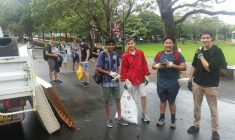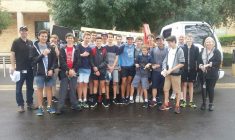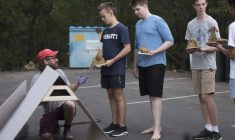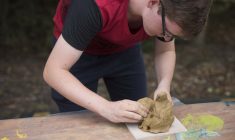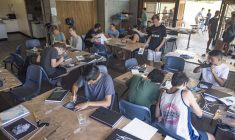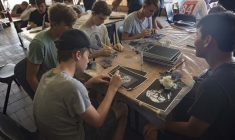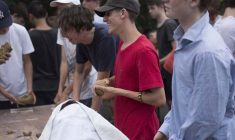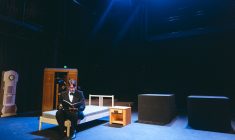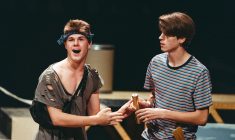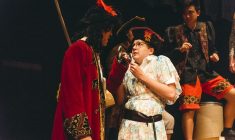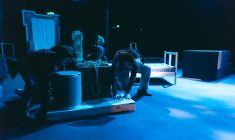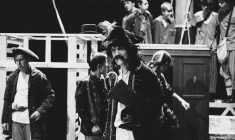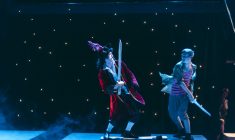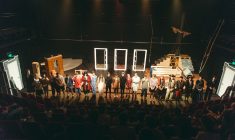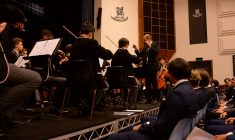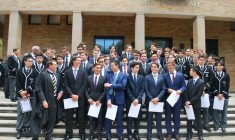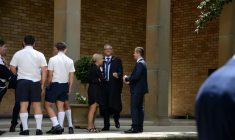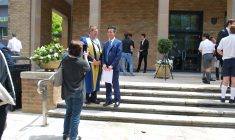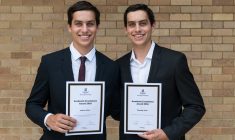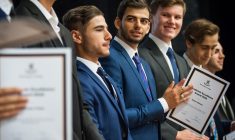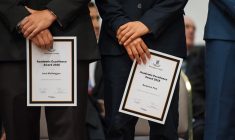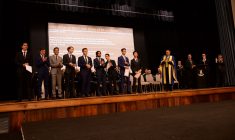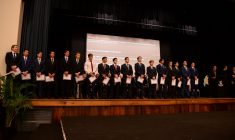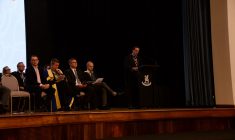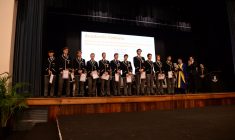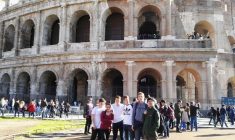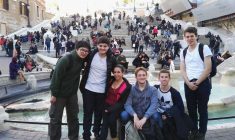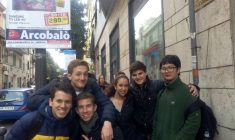New actors soar in Peter Pan
Over three nights of sold-out performances, the Newington College Theatre was transformed into first Georgian London and then, Neverland in JM Barrie’s 1904 play, Peter Pan, a tale of unending youth and a boy who never grew up. Together with girls from MLC school, 19 of our Year 11 and 12 students took to the stage in a fantastical and theatrical re-telling of this well-known tale, directed by Mr. Ben Williams and led by Lachlan McIntyre as Peter Pan and Fin Casey as his nemesis, Captain Hook. Beyond the sword fights, silly pirates and clever word play, for Mr Williams the performances were a celebration of a “belief in theatre and storytelling, and the journeys that these alone can take us on.”
Below we hear from some of the students involved in the production and get a sense of what it means to be a part of a show such as this.
Lachlan McIntrye (11/JN) – Peter Pan
What was the most memorable/enjoyable part of Peter Pan?
The most memorable part for me personally was choreographing the two sword fights with Harrison Saunders. I hadn’t had any experience with sword fighting so it was a really cool and new thing for me to try. As a cast, I think the opening night was our most anticipated and enjoyable performance. All the work we had done had boiled down to three short nights and we wanted to give it our best.
What was the most challenging part of production?
Blocking the play was fairly difficult as the set featured many layers. There were people running on the balconies, walking up the stairs in the audience and standing on blocks, so just having everyone know where to be at all times was challenging logistically speaking.
What was the most valuable part of the experience?
No matter what year you’re in or what form of drama you’re taking part in, there’s always this profound sense of achievement after being in a show with people you’ve worked with for so long. Everyone becomes closer as a result. The support we give each other is really admirable. Peter Pan has a very distinct style and being able to pull it off was definitely very accomplishing and an experience none of us will forget any time soon.
Fin Casey (12/KL) – Captain J Hook
What was the most memorable/enjoyable part of Peter Pan?
One of the most memorable parts of Peter Pan was actually the last dress rehearsal. Our previous rehearsal had been very lacking and very low energy. But the last dress rehearsal was the best show we had ever done (prior to opening night). It was truly amazing to see how the exact same show, with the same lines, effects, and costumes, could be so much better when we committed to our performance and lifted the energy. I also really enjoyed fighting a small child with a wooden sword and a hook, and the whole process of learning those fights. Also, I was surprised by how good I look with eyeliner and a moustache. Definitely a look for the future.
What was the most challenging part of production?
The most challenging part of the show, besides the usual many hours of rehearsal, was breathing life into a story that we all knew so well, that the audience all knew so well; a story from a different age, from a mind far more creative than any of our own.
What was the most valuable part of the experience?
The most valuable part of the show for me was after the second night I think. A little girl on crutches was introduced to me by her mum, who said that she wanted to meet Hook (of all people), and the girl shyly told me that she really liked the show and that I was her favourite. Personal praise aside, I realised at that moment that the show, which we had worked so hard for, had a real impact on real people, and that we didn’t do the show for us, we did it for them; we did it for her.
Geordie Maclean (11/KL) – First Twin
What was the most memorable/enjoyable part of Peter Pan?
There were certainly plenty of fun times during the rehearsal process, but I feel the best moments were in the classic pre-show warm ups with Mr Williams. The sense of focus and readiness from the whole cast was very exciting ahead of each performance – and contrasting with the jollity and relaxedness of most rehearsals.
What was the most challenging part of production?
Acting with my real life twin – as twins. We certainly had our disagreements, but we could both learn from each other to better develop our characters and grow into our roles for a more natural performance. Another challenging aspect was the nature of the play itself. Having no clear comedic appeal or form of audience engagement, encapsulating the audience in the magical world of Wendy’s imagination required total commitment to the character and narrative, and a high energy performance.
Jack Crawford (12/KL) – Gentleman Starkey
What was the most memorable/enjoyable part of Peter Pan?
The most enjoyable part of the production was most definitely the final week. When we finally began to work with the actual stage and props we would soon go onto perform with, everyone became really hyped up. The pre-show buzz was then escalated upon performing in front of three completely sold out shows. The feelings in the last week are why I do theatre and why I’ll remember this play.
What was the most valuable part of the experience?
This was my last performance at the college, and so it was great to leave with a show in the school’s new theatre under my belt. The floor space and backstage is extremely professional and gave me a great insight into what an acting career could potentially be like. Along with this I learnt how to schedule my time, and I strengthened connections among my friends and those who I had recently met.




